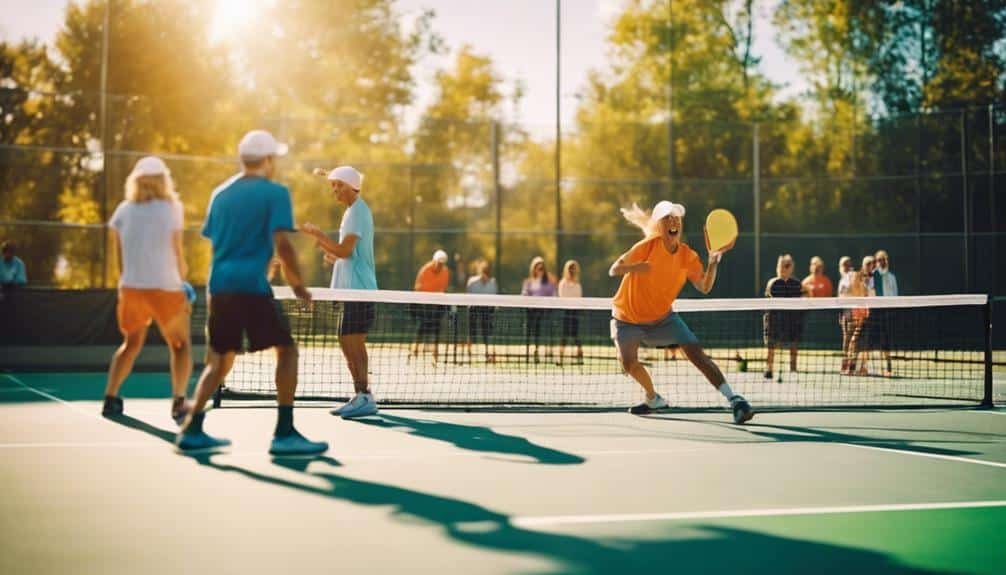I've discovered the key to unlocking joyful play in pickleball, and it's not just about mastering the dink shot or perfecting your serve. It's about embracing mindfulness, quieting your inner critic, and celebrating small victories. By focusing on the present moment and tapping into your intuitive Self 2, you'll enhance both performance and enjoyment. Balancing fun and competition is crucial, as is fostering social connections on and off the court. Setting realistic goals, adopting a growth mindset, and utilizing community resources can significantly boost your pickleball experience. The health benefits of joyful play extend far beyond the court. There's much more to uncover about this transformative approach to pickleball.
Key Takeaways
- Focus on fun and playfulness over perfectionism to deepen connection with the sport and fellow players.
- Practice mindfulness techniques to enhance performance and enjoyment by staying present on the court.
- Quiet your inner critic (Self 1) and tap into your intuitive, creative Self 2 for more instinctive play.
- Set specific, measurable goals and celebrate small victories to boost motivation and confidence.
- Strike a balance between competitive drive and social enjoyment to create a positive playing atmosphere.
The Happiness-Pickleball Connection
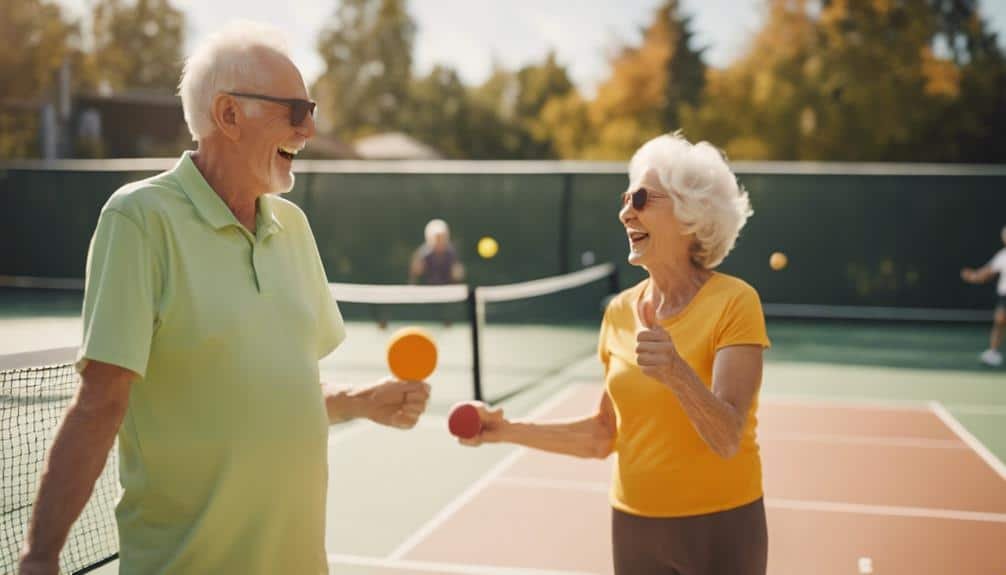
Pickleball's unique ability to foster happiness stems from its blend of physical activity, social interaction, and strategic gameplay.
I've found that identifying personal happiness triggers on the court is crucial for maximizing enjoyment. Whether it's the satisfying pop of a well-executed serve or the thrill of a perfectly placed dink, these moments create joyful memories that keep us coming back for more.
I've learned that focusing on what brings me happiness in pickleball doesn't detract from strategic play. Instead, it enhances my overall performance and motivation.
By prioritizing fun and playfulness over perfectionism, I've discovered a deeper connection to the sport and my fellow players.
I encourage you to explore what makes you happiest in pickleball. Embrace those aspects, set realistic goals, and celebrate small achievements.
This approach won't only improve your game but also enrich your pickleball experience.
Mindful Play on the Court
Mindfulness, a powerful tool for enhancing performance and enjoyment, plays a crucial role in elevating one's pickleball game.
By focusing on the present moment, I've found that I can improve my concentration and react more effectively to each shot. Mindful breathing techniques have helped me stay calm under pressure, allowing me to make better decisions on the court.
To incorporate mindfulness into your pickleball practice, consider these techniques:
Practice deep, controlled breaths between points.
Focus on the sensation of your feet touching the court.
Observe your thoughts without judgment.
Pay attention to the sound of the ball hitting your paddle.
Self 1 Vs. Self 2
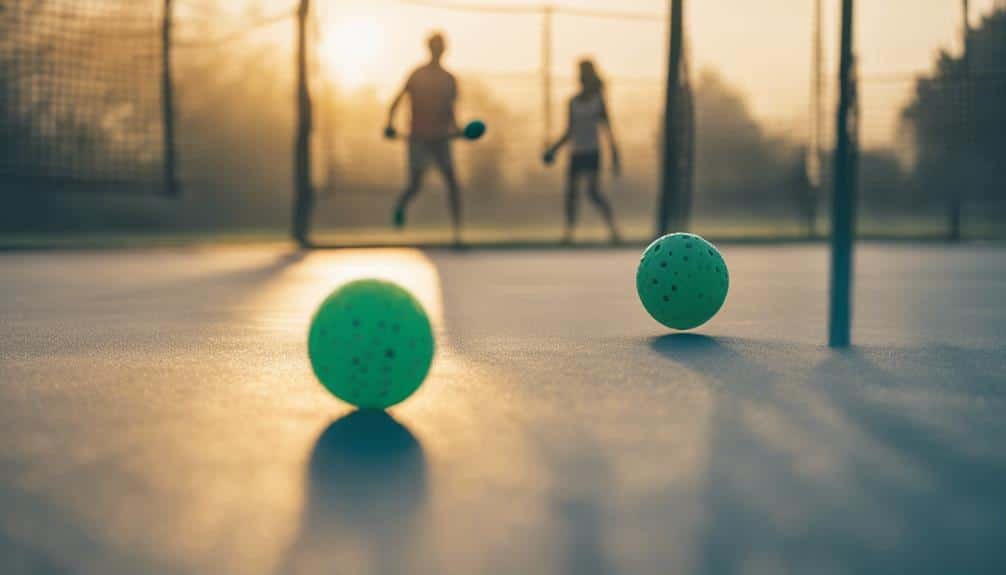
While mindfulness focuses on external awareness, understanding the internal dialogue between Self 1 and Self 2 can significantly impact your pickleball performance.
Self 1, our Internal Critic, often judges and second-guesses our actions on the court. It's the voice that criticizes missed shots and fuels performance anxiety.
In contrast, Self 2 is our Fearless Explorer, the intuitive part of us that taps into our natural abilities and creativity.
To improve your game, learn to recognize when Self 1 is dominating your thoughts. Instead, cultivate a stronger connection with Self 2.
This shift allows you to play more freely, make instinctive decisions, and enjoy the game fully.
By quieting your inner critic and embracing your natural talents, you'll likely experience improved performance and increased happiness on the pickleball court.
Celebrating Small Victories
The journey to pickleball mastery is paved with small victories, each worthy of recognition and celebration.
I've found that goal setting and progress tracking are essential tools in this process. By acknowledging our incremental improvements, we cultivate a positive mindset that fuels our growth.
Set specific, measurable goals for each practice session.
Keep a performance log to track progress over time.
Share achievements with fellow players for mutual support.
Reward myself for reaching milestones, no matter how small.
Social Aspects of Pickleball
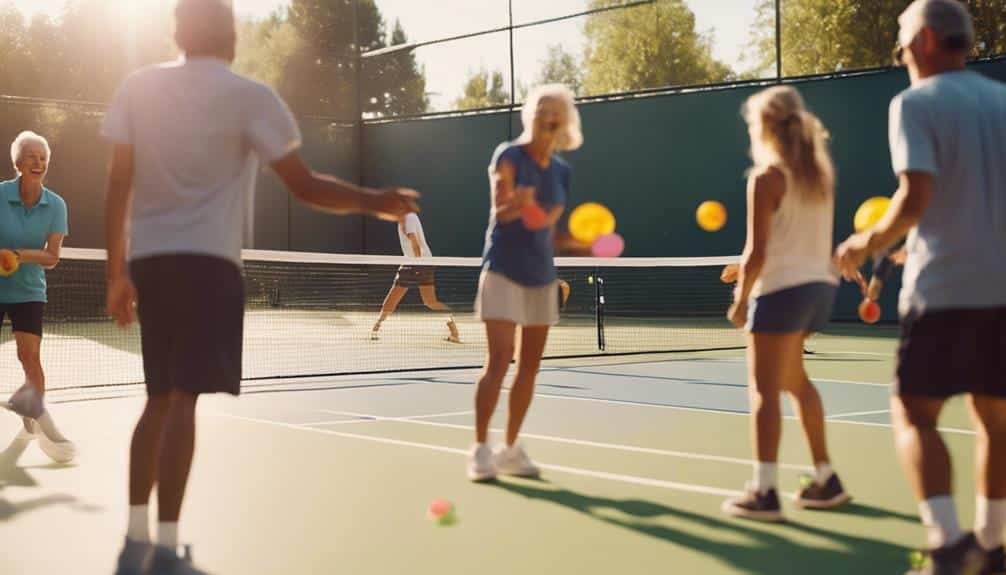
Beyond its physical benefits, pickleball's social aspects play a crucial role in its growing popularity and appeal to players of all ages.
I've found that the sport fosters a unique sense of community and camaraderie on and off the court. Court etiquette is paramount, promoting respect and sportsmanship among players.
By adhering to these unwritten rules, we create a welcoming environment that encourages inclusivity and mutual support.
The social bonds formed through pickleball extend beyond the game itself.
I've witnessed friendships blossom as players gather for post-game socializing, organize tournaments, and share tips and strategies.
This interconnectedness not only enhances our enjoyment of the sport but also contributes to our overall well-being.
Mental Game Strategies
Mastering pickleball's mental game requires a strategic approach that balances Self 1 and Self 2, enhancing performance and enjoyment on the court.
I've found that managing my internal dialogue is crucial for success. By recognizing when Self 1's critical voice is dominating, I can shift focus to Self 2's intuitive capabilities.
To improve your mental game, consider these strategies:
- Practice mindful breathing to stay present and calm during matches.
- Set realistic goals and celebrate small achievements to boost confidence.
- Cultivate a growth mindset by viewing challenges as opportunities to learn.
- Develop pre-shot routines to maintain focus and consistency.
Balancing Fun and Competition
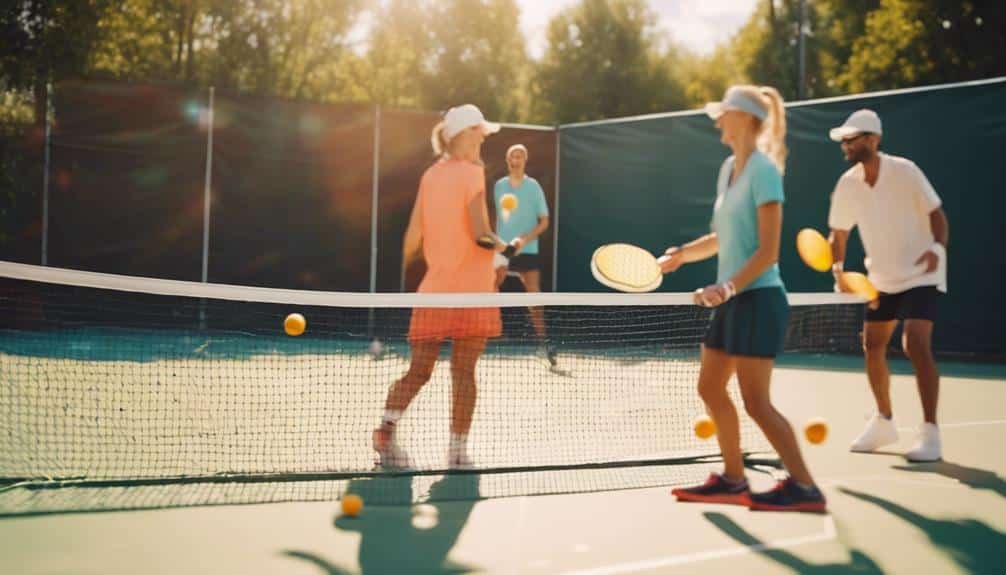
In pickleball, striking a balance between enjoyment and competitive drive is crucial for long-term success and satisfaction on the court.
I've found that cultivating a competitive mindset doesn't mean sacrificing fun dynamics. Instead, I focus on setting realistic goals and celebrating small achievements, which allows me to maintain a sense of progress while still enjoying the game.
I've learned to prioritize learning and improvement over winning, which helps me stay motivated without becoming overly stressed.
By practicing mindfulness and presence during matches, I'm able to fully immerse myself in the experience, enhancing both my performance and enjoyment.
I've discovered that emphasizing social connections and playfulness, rather than perfectionism, creates a more positive atmosphere on the court.
This balanced approach has significantly improved my overall pickleball experience and fostered a sense of belonging within the community.
Embracing Personal Growth
Embracing personal growth in pickleball requires a deliberate approach to self-improvement that extends beyond mere skill development.
I've found that adopting a growth mindset is crucial for overcoming personal challenges and continually evolving as a player.
To foster this mindset, I recommend the following strategies:
Set specific, measurable goals for each practice session.
Reflect on your performance and identify areas for improvement.
Seek feedback from more experienced players or coaches.
Embrace failures as learning opportunities rather than setbacks.
Community Resources for Players
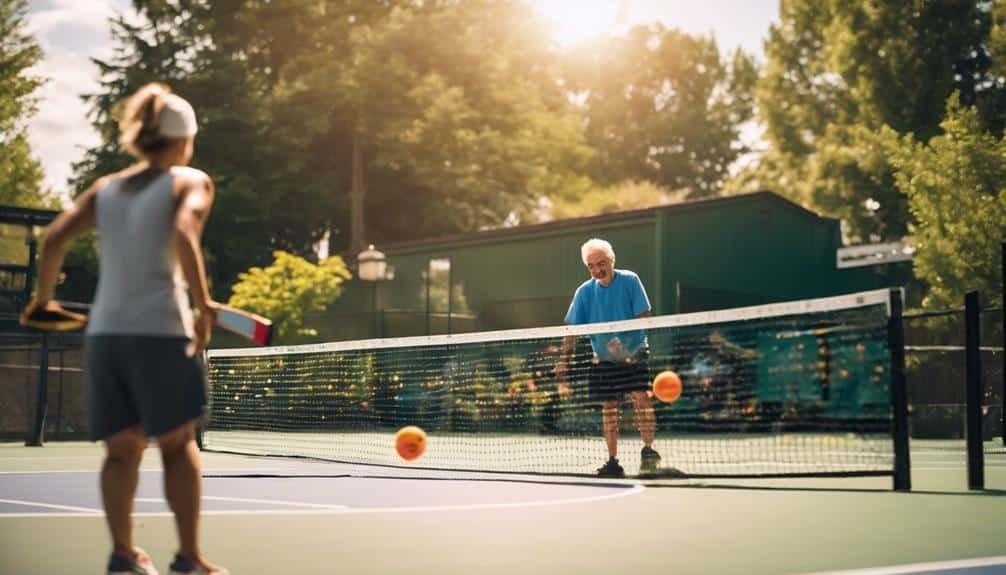
Numerous community resources are available to support pickleball players in their journey of skill development and personal growth.
One of the most valuable resources is the Pickleball Therapy podcast, which delves into the mental and emotional aspects of the game. It's been instrumental in helping me understand the concept of Self 1 and Self 2, improving my mental game significantly.
I've also joined the Better Pickleball Facebook Community, where I've connected with fellow enthusiasts and gained access to a wealth of knowledge and support.
It's a great place to share experiences, ask questions, and learn from others' insights.
Health Benefits of Joyful Play
Joyful play in pickleball yields a multitude of health benefits that extend beyond mere physical fitness.
As a player, I've experienced firsthand how Pickleball therapy can boost both mental and physical well-being. When we engage in joyful play, we're more likely to sustain our exercise motivation, leading to consistent participation and improved health outcomes.
The health benefits of joyful pickleball play include:
- Enhanced cardiovascular health
- Improved cognitive function
- Reduced symptoms of anxiety and depression
- Increased social connections
Conclusion
As I've journeyed through the pickleball landscape, I've discovered that joy is the hidden treasure map.
By navigating the terrain of Self 1 and Self 2, I've unearthed the gold of mindful play.
I've learned to celebrate each small victory like a prospector finding a nugget.
Through this expedition, I've realized that the true riches lie not in winning every match, but in the community we build and the personal growth we achieve.

